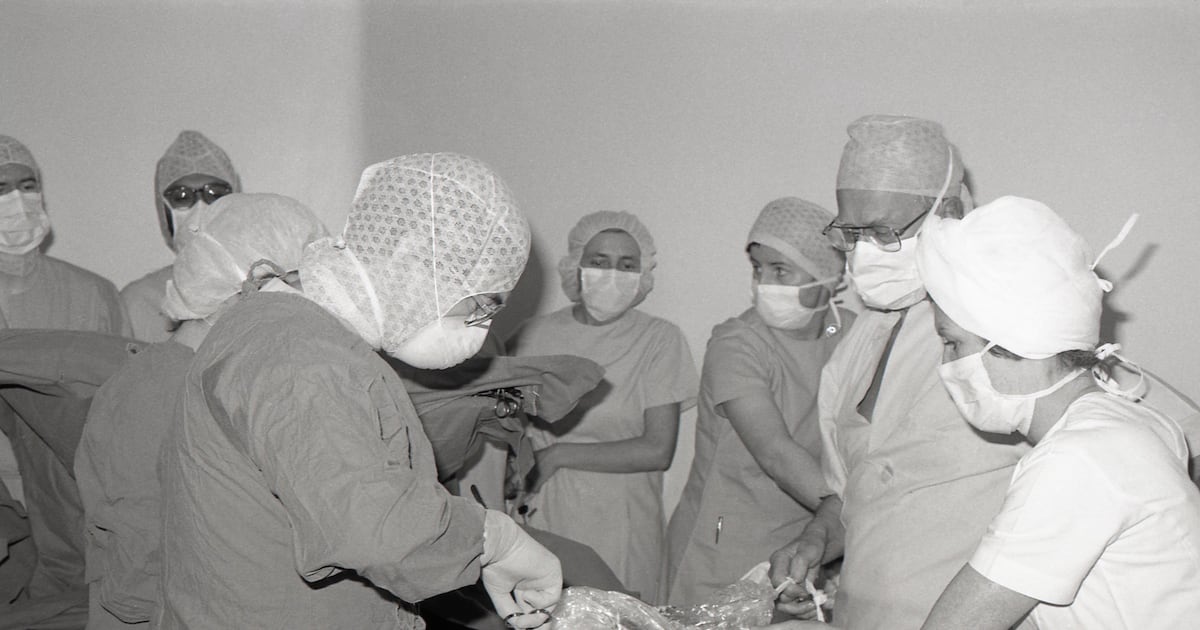On September 10th, 1985, surgeons at the Mater hospital in Dublin carried out Ireland’s first heart transplant.
Together with the late Maurice Neligan, renowned heart surgeon Prof Freddie Wood formed part of the team that performed the operation 40 years ago.
Prof Wood recalls the excitement and novelty of transporting the precious cargo by helicopter from Co Wexford.
“We didn’t anticipate that we’d have to fly to get the donor. The donor came from Wexford General Hospital … I was really excited because I was flying in the helicopter. It was wonderful to fly over the Wicklow Mountains down to Wexford.”
After landing at the airbase in Baldonnell, Co Dublin, the young surgeon was given permission to drive the donor heart to the Mater himself.
“The anaesthetist allowed me to drive it back in with a police escort, which we did in about 10 minutes.”
Two decades later, he would carry out Ireland’s first lung transplant.
Speaking about cardiac care in Ireland today, Prof Wood said heart intervention is more important than ever as heart interventions will be needed increasingly due to the country’s ageing population.
“Heart surgery and heart disease will continue as long as people live. Indeed, dealing with problems now because the population is getting older, it’s more likely that they’ll need more and more heart intervention.”
Ewa Mikuta (42), from Cork, is one of 447 patients who have been given hearts as part of the hospital’s transplant programme.
Eva Mikuta, who underwent a heart transplant in 2018 at the Mater, revisits the hospital to celebrate its 40th anniversary of heart transplants. Photograph: Alan Betson
Originally from Poland and living in Ireland since 2006, Mikuta was diagnosed with dilated cardiomyopathy in 2017. Despite medication, her condition deteriorated, and after six months with an implantable cardioverter-defibrillator, she “couldn’t walk. I had a problem with breathing.”
In September 2018, Mikuta was referred to the Mater hospital where she was admitted for further care. She was placed on the transplant list on October 1st and received her new heart just 32 days later.
Mikuta enjoyed a remarkable recovery, getting back in the saddle of her horse Unicorn four months after her transplant surgery in November 2018. She recalls being able to ride an exerciser bike in the hospital only days after surgery.
“I was still connected to all the IVs and cables and monitors but I was able to walk around the room and I was able to cycle.”
After a quiet Christmas recovering at home with her husband and then 10-year-old son, Mikuta felt ready to get back to horse riding. She had named her horse from a hospital bed.
“I remember sitting in the hospital and some of my friends gave me a little stuffed toy – like a unicorn – and I had nothing else to do. I decided to register his name and called him Unicorn.”
Tomcy Baby, one of Mikuta’s post-heart transplant clinical nurse specialists, described following her patients’ journeys as “an amazing feeling”.
Heart transplant patient Ewa Mikuta with Tomcy Baby, a post-cardiac transplant clinical nurse specialist who looked after her. Photograph: Alan Betson
“It’s an amazing job and an amazing feeling. I’m privileged to work with the transplant patients and to see their journey. To see how sick they were pre-transplant and how well they are doing after transplant.”
Baby has now worked in the Mater for almost 20 years.
The hospital first began its heart transplant programme in 1985 and continues to be the national centre for heart and lung transplants.
Prof Emer Joyce, consultant cardiologist at the Mater, said the median life expectancy after transplant is now 15 years, with “outcomes getting much better” for patients.
[ A revolution in heart disease? Focus shifts to staying ahead of the blockageOpens in new window ]
“Ewa and our other recipients just show how organ donation saves lives. None of this would be possible without phenomenal generosity in the face of unimaginable grief.”
“Thankfully we are seeing our recipients live into their second and third decade, and even touching their fourth decade like Andy,” she said.
Andy Kavanagh, from Coolock in Dublin, was one the first patients to undergo the surgery in 1986 and is Ireland’s oldest surviving heart transplant patient.
Also one of the longest surviving patients in the world, Kavanagh joined Mikuta and other patients at the hospital on Wednesday to celebrate the transplant programme’s milestone anniversary.

